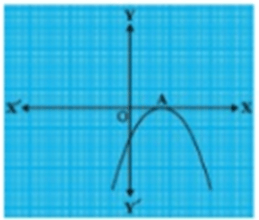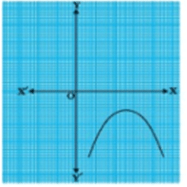PROBLEMS ON ZEROS OF POLYNOMIAL
Subscribe to our ▶️ YouTube channel 🔴 for the latest videos, updates, and tips.
Subscribe to our ▶️ YouTube channel 🔴 for the latest videos, updates, and tips.
Problem 1 :
The value of k for which -4 is a zero of the polynomial
x² - x - (2k + 2) is
a) 3 b) 9 c) 6 d) -1
Solution :
x² - x - (2k + 2)
As (-4) is zero of above polynomial. So,
(-4)² - (-4) - (2k + 2) = 0
16 + 4 - 2k -2 = 0
20 - 2k - 2 = 0
-2k = -18
k = 18/2
k = 9
So, option (b) is correct.
Problem 2 :
If the zeros of the quadratic polynomial
ax² + bx + c, c ≠ 0
are equal, then
a. c and a have opposite sign
b. c and b have opposite sign
c. c and a have same sign
d. c and b have same sign
Solution :
Given that, the zeros of the quadratic polynomial
ax² + bx + c, c ≠ 0 are equal (D) = 0
Discriminant
b² - 4ac = 0
b² = 4ac
Which is only possible when a and c have the same sign.
So, option (c) is correct.
Problem 3 :
The number of zeros of the polynomial from the graph is

a) 0 b) 1 c) 2 d) 3
Solution :
The curve does not cross x-axis, it touches the x-axis. So, it has two zeroes but both are same.
So, option (c) is correct.
Problem 4 :
If one of the zero of the quadratic polynomial
x² + 3x + k is 2
then the value of k is
a) 10 b) -10 c) 2 d) 3
Solution :
p(x) = x² + 3x + k
2 is a zero of p(x), then
p(2) = 0
2² + 3(2) + k = 0
4 + 6 + k = 0
10 + k = 0
k = -10
So, option (b) is correct.
Problem 5 :
A quadratic polynomial whose zeros are -3 and 4 is
a) x² - x + 12 b) x² + x + 12
c) 2x² + 2x - 24 d) none of the above
Solution :
Quadratic equation with α and β as roots can be written as
x² - (α + β) + αβ = 0
Here, α = -3 and β = 4
α + β = -3 + 4 = 1
α × β = -3 × 4 = -12
The quadratic equation is
x² - (α + β) + αβ = 0
x² - x - 12 = 0
p(x) = x² - x - 12
So, option (d) is correct.
Problem 6 :
The relationship between the zeros and coefficients of the quadratic polynomial
ax² + bx + c is
a) α + β = c/a b) α + β = -b/a
c) α + β = -c/a d) α + β = b/a
Solution:
The relationship between the zeros and the sum of the zeros is given by
Sum of zeros (α + β) = -(Coefficient of x) / Coefficient of x²
α + β = -b/a
So, option (b) is correct.
Problem 7 :
The zeros of the polynomial
x² + 7x + 10 are
a) 2 and 5 b) -2 and 5 c) -2 and -5 d) 2 and -5
Solution :
x² + 7x + 10 = 0
x² + 5x + 2x + 10 = 0
x(x + 5) + 2(x + 5) = 0
(x + 2) (x + 5) = 0
x = -2 or x = -5
So, option (c) is correct.
Problem 8 :
The relationship between the zeros and coefficients of the quadratic polynomial ax² + bx + c is
a) α · β = c/a b) α · β = -b/a
c) α · β = -c/a d) α · β = b/a
Solution :
The relationship between the zeros and the product of the zeros is given by
Product of zeros (α · β) = constant term / Coefficient of x²
α · β = c/a
So, option (a) is correct.
Problem 9 :
The zeros of the polynomial x² - 3 are
a) 2 and 5 b) -2 and 5
c) -2 and -5 d) none of the above
Solution :
x² - 3 = 0
x² = 3
x = ± √3
Therefore, the zeros of the given polynomial are √3 and -√3.
So, option (d) is correct.
Problem 10:
The number of zeros of the polynomial from the graph is

a) 0 b) 1 c) 2 d) 3
Solution :
The zeros of the polynomial are the points where the graph intersects the x axis. In the given graph, the curve intersects the x axis at 0 point, therefore, the number of zeros of the polynomial is 0.
So, option (a) is correct.
Problem 11 :
A quadratic polynomial whose sum and product of zeros are -3 and 2 is
a) x² - 3x + 2 b) x² + 3x + 2
c) x² + 2x - 3 d) x² + 2x + 3
Solution :
Let the zeros be α and β.
α + β = -3 and αβ = 2
The quadratic polynomial whose sum and product of the zeros are given is
x² - (α + β)x + αβ
Then the quadratic polynomial will be
= x² - (-3)x + 2
= x² + 3x + 2
So, option (b) is correct.
Problem 12 :
The zeros of the quadratic polynomial x² + kx + k, k ≠ 0,
a. Cannot both be positive
b. Cannot both be negative
c. Are always unequal
d. Are always equal
Solution :
We know that, the zeros of a polynomial ax² + bx + c
Sum of zeros = -b/a
Product of zeros = c/a
Here a = 1, b = k, c = k
Sum of the roots = -b/a
= -k/1
= -k
Product of the roots = c/a
= k/1
= k
If k is negative :
Sum is positive, product is negative.
One zero will be positive, one will be negative.
If k is positive :
Sum is negative, product is positive.
So, in both cases, both zeros cannot be positive.
So, both zeros are negative.
So, option (a) is correct.
Recent Articles
-
Finding Range of Values Inequality Problems
May 21, 24 08:51 PM
Finding Range of Values Inequality Problems -
Solving Two Step Inequality Word Problems
May 21, 24 08:51 AM
Solving Two Step Inequality Word Problems -
Exponential Function Context and Data Modeling
May 20, 24 10:45 PM
Exponential Function Context and Data Modeling